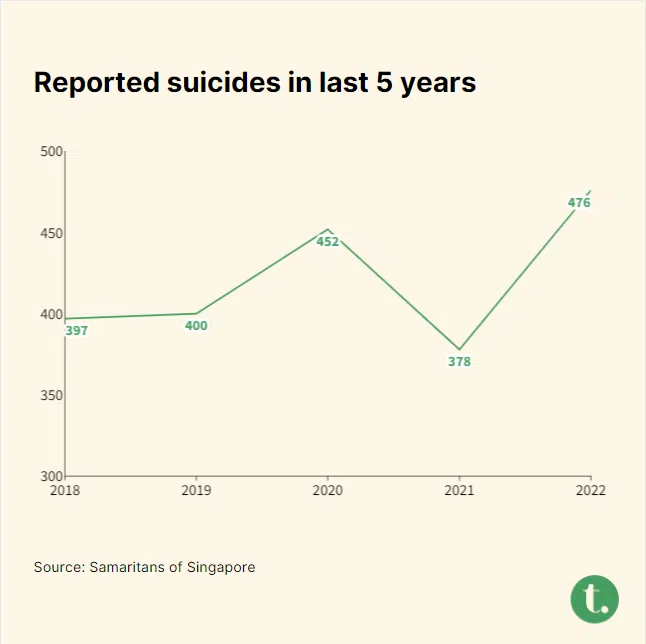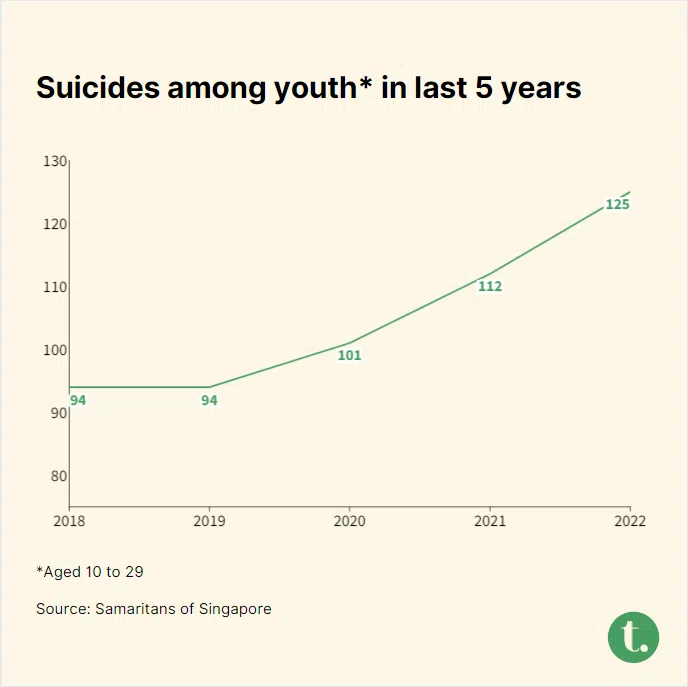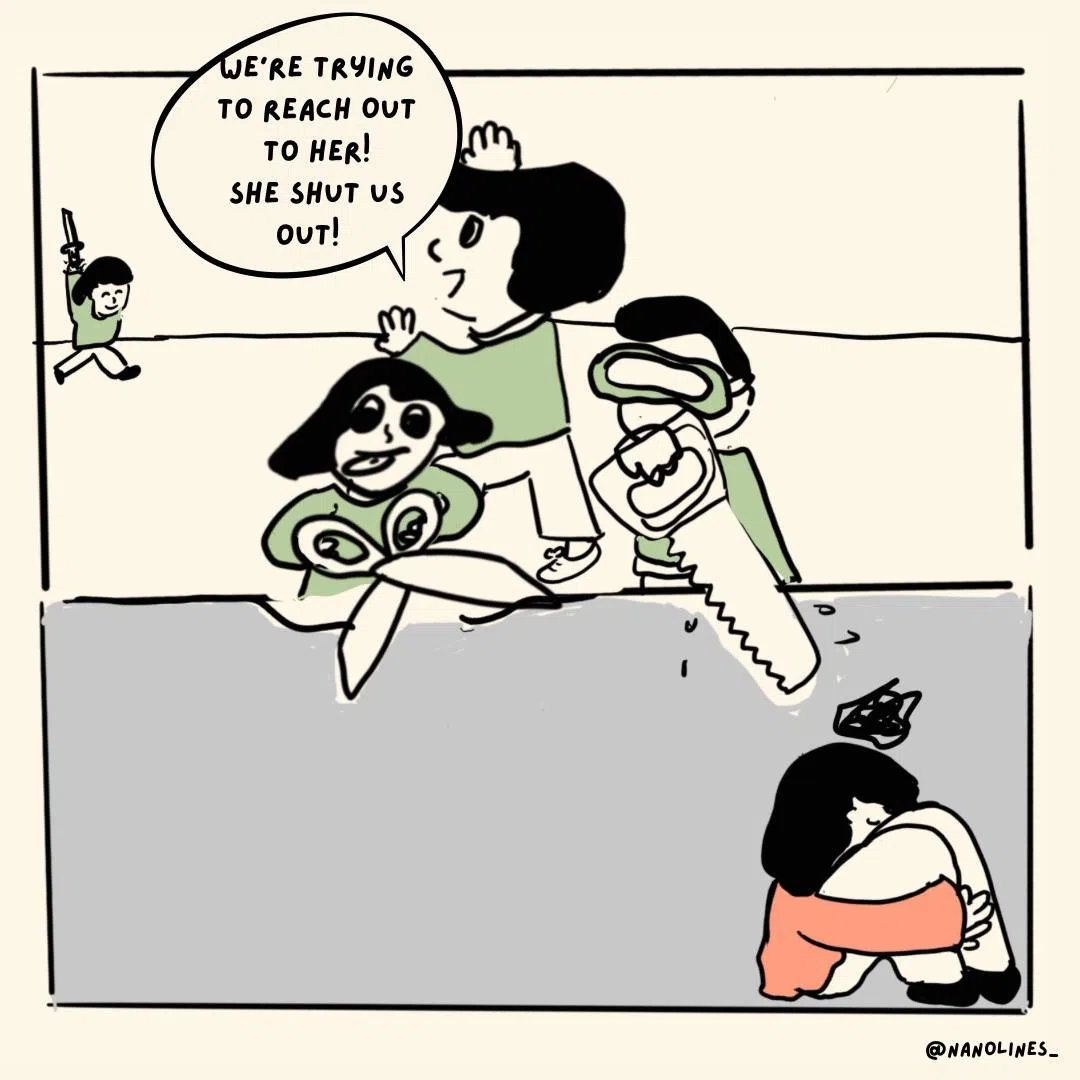💬 We need to talk about suicide

- Find out more and sign up for Thrive at bt.sg/thrive
⛈️ Sombre stats

Last year, 476 suicides were reported in Singapore. This was 26 per cent higher than the tally in 2021, with a notable increase among youths and the elderly.
Among the cases reported last year, 125 individuals were aged 10 to 29, accounting for about a third of all deaths in this age group. Suicide remained the leading cause of death for youths for the fourth consecutive year.

Young people are particularly at risk of suicide, mental health advocate Anthea Ong tells Thrive.
“We forget that the brain’s executive control centre is not fully developed until our mid 20s,” she says. That makes young people more impulsive, a trait associated with suicidal acts and thoughts.
“In addition, they have to go through many major transitions within a short space of time, including new relationships and environments to navigate,” adds Ong, who championed for suicide prevention while she was a Nominated Member of Parliament from 2018 to 2020.
🤗 Knowing when a friend needs support

The rising figure isn’t a hopeless situation, though. Suicide is preventable, and it’s therefore crucial to look out for signs from individuals who are considering going down that path. Ong notes that many studies have shown a majority of people who died by suicide gave some indication of their intentions to a loved one.
Navigate Asia in
a new global order
Get the insights delivered to your inbox.
🔎 When someone you know starts showing these signs, it’s time to pay attention:
- Unusual or sustained changes in behaviour , such as withdrawal from social activities, or loss of interest or motivation in work or hobbies
- Making comments such as “everyone will be better off without me” or “what’s the point of living?”
- Showing feelings of guilt, helplessness or hopelessness
- Physical changes, especially poor sleep or loss of appetite
Suicidal thoughts don’t only happen to those with an existing mental illness. Sometimes, they may be tied to a recent distressing or traumatic event, such as a breakup, job loss or the death of a loved one.
I’m here to listen
Having survived a suicide attempt in 2016, Sabrina Ooi, 33, knows how important the support of friends and loved ones can be to someone experiencing mental health struggles.
That year, Ooi was going through what she calls her worst depressive episode, which had been triggered by several stressful events.
Because of the stigma and lack of understanding towards mental health, it was hard for her to share her struggles with others without being met with unhelpful responses like “you’re just being dramatic” or “just sleep it off”.
As she contemplated ending her life, a passer-by called the police and Ooi was arrested (attempting suicide was illegal then).

Since then, she has received treatment from mental health professionals and co-founded Calm Collective Asia, a social enterprise that aims to normalise mental health conversations.
Ooi tells Thrive how we can give constructive support to a friend or loved one who may be having suicidal thoughts.
Lead with empathy and compassion. Try your best to understand how the person you’re supporting is feeling. Acknowledge that what they’re going through is valid, and that you are here to support them however they need it.
Spend time with them. “Just being together helped me feel okay to simply exist,” Ooi says of her experience. As she was recovering, a few friends took the time to take a walk or watch a show with her, without having to talk about or try to “fix” what she was going through, which she appreciated.
Avoid telling them to “look on the bright side” of things. Even though we want to try moving the person away from negative feelings or thoughts, hearing such statements can be invalidating.
Avoid giving advice or trying to solve or fix the situation, unless the person explicitly asks for it. A good question to ask is: “Would you like me to listen or share my thoughts?” Avoid asking why they’re feeling a certain way or not doing something to help themselves. “Why” questions can come across judgemental and may belittle their struggles. Instead, ask open-ended “What” or “How” questions: “How are you feeling today?”, “What might help you feel better?”, “How can I support you as a friend?” “Some years after my depressive episodes, I learned that a group of friends had started a WhatsApp support group for each other while they were supporting me,” says Ooi. “It’s really important to acknowledge that supporting someone who is depressed or suicidal can take an emotional toll, and that you need to set up your own support system too. They used that group to “take turns” to support me… I’m very lucky to have my friends!”
Helplines
Mental well-being
- Institute of Mental Health’s Mental Health Helpline: 6389-2222 (24 hours)
- Samaritans of Singapore: 1800-221-4444 (24 hours) /1-767 (24 hours)
- Singapore Association for Mental Health: 1800-283-7019
- Silver Ribbon Singapore: 6386-1928
- Tinkle Friend: 1800-274-4788
- Community Health Assessment Team 6493-6500/1
Counselling
- TOUCHline (Counselling): 1800-377-2252
- TOUCH Care Line (for seniors, caregivers): 6804-6555
- Care Corner Counselling Centre: 6353-1180
Online resources
- mindline.sg
- stayprepared.sg/mymentalhealth
- eC2.sg
- tinklefriend.sg
- chat.mentalhealth.sg
- carey.carecorner.org.sg
- impart.sg
TL;DR:
- A total of 476 suicides were reported last year, the highest in 20 years
- Young people are particularly at risk of suicide
- A majority of people who died by suicide gave some indication to a loved one
- For someone having suicidal thoughts, just having friends who spend time with them can help them feel better
Copyright SPH Media. All rights reserved.